Ataollah Mohajerani, a former vice-president and Minister of Culture for the Islamic Republic of Iran who now resides in the United Kingdom, has doubled down on a book he wrote praising a 1989 fatwa to kill the author Salman Rushdie.
The British writer is currently in hospital after being attacked and stabbed multiple times by a 24-year-old assailant at an event on Friday. It came 33 years after Ayatollah Khomeini called on “all brave Muslims” to “execute” Rushdie after the content of one of his novels, The Satanic Verses.
That same year, Mohajerani wrote and published A Critique of the Satanic Verses Conspiracy, which praised the fatwa and gleefully described the torment it must have caused Rushdie, who went into hiding for 10 years. The text was translated into several other languages.
Today Mohajerani describes himself as a “historian” and was formerly a board member of the KAICIID Dialogue Centre, which promotes interreligious and intercultural tolerance. Despite this, he has continued to defend his book in the aftermath of the Rushdie’s apparent attempted murder.
In a series of tweets over the weekend, Mohajerani said the royalties he had received from the 30 editions of his book were “legitimate and sweet”, and while out walking on Saturday he had contemplated the introduction to the 31st edition.
He also appeared to imply that Rushdie could learn from the attempt on his life, stating (with some oversimplification) that “In His Nobel Prize speech, [William] Faulkner said: 'Through his work, the writer must add to beauty, goodness, piety and love of mankind.' We see few signs of this in Salman Rushdie’s oeuvre. I hope that after this tragic incident he will find a chance to write a novel that listens to Faulkner. Not insults to Mohammad and Abraham and Mary.”
What Did Mohajerani’s Book Say?
The conclusion drawn by Mohajerani in A Critique of the Satanic Verses Conspiracy was that Rushdie was an “innate apostate”. In 1989, he wrote: “Almost all Muslim schools of jurisprudence share the view that whoever insults the prophet deserves to be killed. His repentance cannot be accepted.
“Considering his clear confession in his book The Jaguar Smile that he is an infidel, and given that he has insulted and ridiculed the beliefs of the Muslims, he [Rushdie] is an apostate... and since his insults, ridicules and affronts are intentional and by choice, he is an innate apostate.”
Mohajerani supported his argument by quoting stories about the prophet: “After Mecca was conquered, the Prophet of Islam forgave all infidels except those who were insulting Islam, and Muslims killed them” – even though those people had taken refuge in the Kaaba.
He also quoted another hadith about K’ab ibn al-Ashraf, a Jewish leader and poet in Medina, who is said to have written sensual poems about Muslim women. When a Muslim asked the Prophet Mohammad’s permission to deceive al-Ashraf with a lie and kill him, the prophet, according to the story, agreed.
“You Do the Other Thing”
In another tweet on Saturday, Mohajerani wrote that back in 1997, when he was in the Iranian parliament ahead of the vote to confirm him as President Khatami’s Culture Minister, an MP – Ali Zadsar, for Jiroft in Kerman province – had asked him if he would be prepared to kill Salman Rushdie if they ever crossed paths.
In Mohajerani’s own telling, he had replied: “I am a writer and my job was to explain Imam’s [Khomeini’s] fatwa and critique the novel. You do the other thing.”
Three years ago he had tweeted a similar claim: “Bless the late Zadsar, who asked me: ‘Would you kill Salman Rushdie if you see him?’, and I said: ‘Everybody is made for something. I wrote the critique; you do the other thing.’”
During that same introduction of would-be cabinet ministers in 1997, Mohajerani had told MPs that he decided to write a critique of The Satanic Verses right after the fatwa was issued. It reportedly took him just 40 days, during which he slept for barely 30 to 40 minutes a day. By the close, he said, he was so tired he was unable to move.
Court Proceedings Welcomed as “Golden Opportunity”
Mohajerani’s tweets in response to an author being attacked were met with outrage from social media users, some of whom accused him of inciting terror and called for him to be investigated by the British authorities. But the ex-minister went further, saying on Twitter on Saturday that he would welcome being taken to court over his book in the UK.
“Years ago,” he alleged, “a gentleman who claimed to be a judge at the Hague and an international lawyer, announced that they would sue me so a court in London would extradite me. The whole time he kept asking for the cost of a cup of coffee so he could meet the expenses!”
In the past few days, Mohajerani said, “they’ve again been singing the same song about my book and Imam’s fatwa. I would find a trial at a London court more pleasing than impeachment, and I am ready to benefit from this golden opportunity. So be serious!”
The “international lawyer” Mohajerani referred to was probably Kaveh Moussavi, a human rights lawyer, arbitrator at the International Court of Arbitration and former Head of Public Interest Law at Oxford University. Moussavi's own pages do not describe him as having worked at the Hague.
In 2018, Moussavi told IranWire that in his view, Mohajerani’s work amounted to incitement to murder. But, because the alleged crime was not committed in the UK or subject to universal jurisdiction, it could not be prosecuted outside of Iran. If Mohajerani continued his incitement, he said, it might be feasible to open a case against him in the UK.
Moussavi later wrote: “The arrest of Ataollah Mohajerani as accessory to the crimes of the Islamic Republic is definitely a possibility. Our budget is limited and, for the moment, we can only focus on torturers and murderers. But I have no doubt he could be charged.”
After IranWire’s special on the Salman Rushdie case was published in 2019, the pro-democracy politician Hassan Shariatmadari tweeted that Kaveh Moussavi was in the process of taking legal action against Mohajerani.
In response, Mohajerani tweeted: “Hassan Shariatmadari, son of the Ayatollah [Grand Ayatollah Seyyed Kazem Shariatmadari]... has brought trumped-up charges against me because 30 years ago I wrote a book critiquing Salman Rushdie’s The Satanic Verses and clarified Imam Khomeini’s fatwa based on religious jurisprudence. I suspect that he has read neither The Satanic Verses nor my book. Here you have a secular democrat!”
Questions Unanswered
Mohajerani has made contradictory remarks about his book over the years. In 2010, in an interview with the TV network Al-Arabiya, he said that he was against killing an author because of his writings. When those comments saw him criticized inside Iran, he sought to clarify them, saying instead that he did not believe murder to be “prudent”.
In his book, he claimed, he had analyzed Khomeini’s fatwa from the point of view of various schools of Islamic jurisprudence, and this fatwa was the verdict of one Islamic jurist. He then quoted a statement from Ali Khamenei while the latter was president of the Islamic Republic: “The Iranian government is not sending commandos to kill Salman Rushdie and Ayatollah Khomeini’s fatwa is an Islamic jurisprudential view.”
That statement ran contrary to the official position of Tehran under Ayatollah Khomeini, which had declared unequivocally that Rushdie must be killed. The 15 Khordad Foundation, a parastatal body under the control of the Supreme Leader, later set a financial bounty for Rushdie’s murder. Its then-head was a Khatami supporter.
In 1989, at the time of the fatwa, Mohajerani was serving as Mir Hossein Moussavi’s deputy for parliamentary affairs. In his telling, he asked Hossein Sheikholeslam, a Foreign Ministry official, to find him a copy of The Satanic Verses. He said he received one two days later, and read the book in English.
The account has been contested by other Iranian sources. One cited by the Telegram channel Jame’e Now claimed the book had been translated at speed on the orders of Mahmoud Doaei, head of Ettela’at Publications, after Khomeini’s fatwa, and it was this hasty translation that Mohajerani had deferred to.
“You can guess why the haste,” the source was quoted as saying. “There was no Persian translation of the book and if somebody asked what the fatwa was based, on you had to answer, because the Pakistanis had protested against it!... Nobody knows which jerk had Mr. Khomeini issue that fatwa. Perhaps Mr. Mohajerani can be of help in answering this.”
visit the accountability section
In this section of Iran Wire, you can contact the officials and launch your campaign for various problems





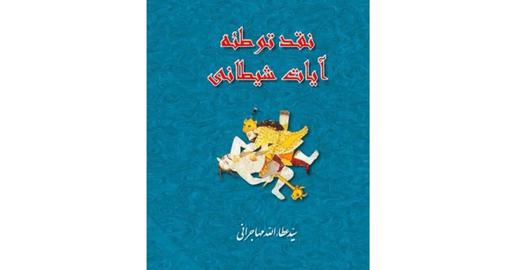

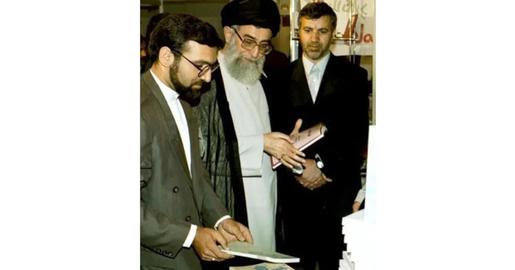

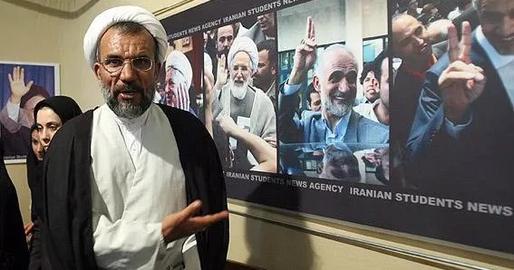




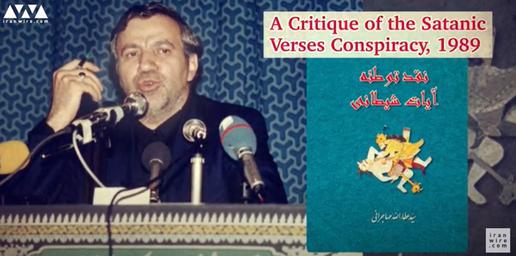
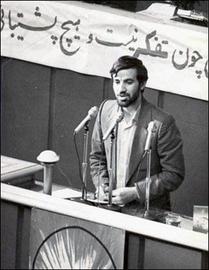












comments